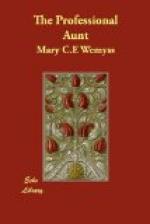“Now, Sara,” I said, “we will build a castle all for our very own selves.”
“Our velly, velly own selves,” said Sara, hugging her spade with ecstasy. “A velly, velly big castle.”
“Very, very big,” I replied.
“A bemormous castle?”
“An enormous castle,” I said, starting to dig the foundations.
“Dat’s a velly, velly vitty hole,” said Sara.
“It’s going to be a castle, darling.”
“For Yaya to live in?”
“Perhaps.”
And Nannie and Aunt Woggles and Hugh and Betty and muvver?”
Sara danced with joy at the prospect, and Sara dancing in bathing-drawers was distracting. I dug industriously, however, and it was very hot. Sara looked on, occasionally watering the castle and me too.
“Not too much water, darling,” I said, “because it makes Aunt Woggles so wet.”
Sara subsided for the moment. “Is it a velly big castle?” she asked every now and then with evident anxiety.
“It’s going to be, darling,” I said.
“It’s a velly, velly small castle now,” she said sadly.
I dug harder and harder, and it seemed to me that the castle was becoming quite a respectable size, but Sara’s interest had flagged.
“Aunt Woggles,” she said.
“Yes, darling,” I answered.
“Sall we dig a velly, velly deep hole, velly, velly deep, for all ve cwabs, and all ve vitty fish, and Nannie and Aunt Woggles?”
“A very big hole,” I said; “but look at the lovely castle!”
“Yaya doesn’t yike ’ollid ole castles,” she said.
I began to dig a hole. One does these things, I find, for the Saras of this world, and Sara was for the moment enchanted, but it didn’t last long.
“Yaya’s so sirsty,” she said. “Yaya wants a ’ponge cake.”
“I think you would rather have some milk, darling,” I said.
“Yaya’s so sirsty,” she said in a very sad voice. “Yaya would yike a ’ponge cake!”
“Very well, darling; but don’t you want to dig any more?”
“No,” she said. “Yaya doesn’t yike digging.”
Now was that fair? — digging, indeed, when it was the poor aunt who had been digging all the time. When I told Diana of this she shook her head and said, — Betty, it frightens me. Do you think Sara will grow up that sort of woman?”
“What sort of woman?”
“Like Polly in Charles Dudley Warner’s ‘My Summer in a Garden.’ You remember when the husband says, ’Polly, do you know who planted that squash, or those squashes?’”
“‘James, I suppose.’
“Well, yes, perhaps James did plant them, to a certain extent. But who hoed them?’
“We did.’”
“Well, it seems to me,” I said, “that she was rather a delightful person.”
“In a book, absolutely delightful. I am only thinking of Sara’s husband, poor man! You see Polly’s husband was an American, and that makes all the difference. You remember I told you of a man I met who in decorating his house wanted to have red walls as a background to his beautiful pictures, and his wife wanted to have green. I asked him what he did, and he said he made a compromise. I said how clever of him, how did he do it? and he said, ’We had green!’ You see, Betty, what an American husband means!”




